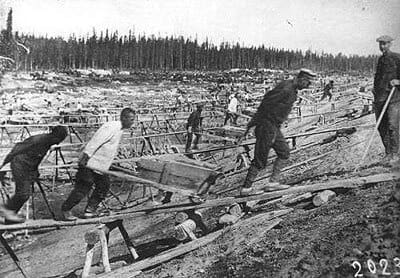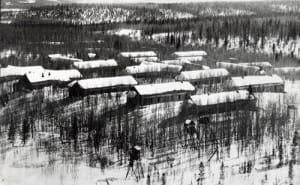
Sergei Lebedev is the author of Oblivion, The Year of the Comet, The Goose Fritz and Untraceable.
One day, on a cold winter eve, my father took his rifle down from the rafter to clean it. In answer to my unspoken request, he took out, from under the ceiling of the apartment, tightly bundled heavy canvas sleeping bags, a threadbare, faded rucksack, marsh boots, smoky mess kits, an officer’s field desk for maps, and a geologist’s hammer—his expeditionary equipment. While he took apart the rifle and cleaned the barrels with the ramrod, I, who had never been farther than the dacha, looked at these items from his past—and I knew who I’d become when I grew up, where the blue arrow of the compass, with its cracked leather strap, would take me.
North. And East.
I don’t know or remember what my peers dreamed about. My book of desires was a geographical atlas of the USSR, a giant folio with maps on the scale of 1:2,500,000, twenty-five kilometers to one centimeter. I’d open at random to a page with a map of the Transbaikal or the Archangelsk region, drink in, swallow from the pages the names of rivers and mountain ranges, distant islands in the polar seas; I’d imagine where I’d go, alone in a dark valley, along susurrus rivers in the fog, with clear stars climbing above the glaciers at the foot of a gorge. Neither my friends nor my comrades appeared in these dreams. Only untamed spaces, and their calling out to me.
North. And East.
My parents’ friends used to gather at our apartment—the same geologists, geophysicists, the staff from polar expeditions. They held conversations over vodka, sang songs—the songs you wouldn’t hear over the radio, songs of the camps, songs of the arrestees. And an icy chill from the faraway places would blow over the table, over the simple snacks and the shot glasses, and the air of celebration abated, as if the others at the table saw what I couldn’t see—some sort of frozen abyss, where people disappeared without a trace; a dark ill-boding secret arose behind snatches of words about the abandoned barracks, exiles who were enlisted into labor, about the unknown graves.
What could I comprehend of this? Nothing. But those far-off evenings, those voices, they did something to me, mingling with the inner whisperings of blood; something further sharpened, further aimed the arrow of the compass: North, and East.
There was only one figure of childhood that was able to, if you will, divert the arrow. At my grandmother’s house—my mother’s mother—there was a hefty box of war decorations and medals. It weighed a kilogram or two. The Order of Lenin, two Red Banners, two Red Stars, countless medals; sometimes I was allowed to look at them, hold them in my hands, my fingers growing numb. My grandfather, first husband of my grandmother, was a company commander in Stalingrad, and I always knew, though nobody ever told me, that these were his decorations, the decorations of a true hero.
When nobody was looking, hesitating out my own impudence, I would pin one of the orders onto my shirt and stand in front of the mirror. And I no longer saw mountain valleys, but frozen ditches, oncoming German tanks, black smoke, misty, snow-covered fields. There was probably nobody who was more Soviet than I was at that moment, a ten or eleven year old kid, frozen in front of the mirror wearing somebody else’s—though mine, too, in a way—medal, which was pulling comically on the pocket of my child’s t-shirt.
To fight and die for one’s country; to adapt somebody else’s biography as your own—a child of the last generation of the Soviet Union, I was still open to its heroics, its myths, its hagiographies, behind which I didn’t suspect the possibility of deceit.
This ebbed when I was a teenager, of course, but still something remained deep in me: like honor or pride, like a feeling that you’re a purposive link in the chain of generations.
And then, life determined what came next—which arrived like a telegram, a sign from my own personal future, too massive to understand it at that age.
At fifteen I set off to work on my first geological expedition—there, to my coveted North, to the promised land of the East. In the city of Pechora we plunged into a helicopter to fly to the pre-polar Ural Mountains. The old Mil helicopter took off roughly from the field, gained speed, gathered height, and the striped, prison-camp color scheme of the heat electropower station flashed by, and jagged clouds, a sliver of Pechora with the scattered logs of tree felling on the shoals—and all the sudden, just like an irregular heartbeat, the entire taiga opened up for tens of kilometers all around.
 There was a strange bald patch that could be seen in the middle of the taiga, half overgrown roads and toy-like houses (from the distance), with caved-in roofs, grey and black, decorated by light lilac-covered smears. Smears the color of fireweed, the plant that grows on fire sites and vacant lots. And all of this—again, from a bird’s eye view—came together into a certain scheme, an architectural draft, as if an invisible hand had scattered them all across the taiga, united by roads, decayed bridges over rivers.
There was a strange bald patch that could be seen in the middle of the taiga, half overgrown roads and toy-like houses (from the distance), with caved-in roofs, grey and black, decorated by light lilac-covered smears. Smears the color of fireweed, the plant that grows on fire sites and vacant lots. And all of this—again, from a bird’s eye view—came together into a certain scheme, an architectural draft, as if an invisible hand had scattered them all across the taiga, united by roads, decayed bridges over rivers.
Not believing, not wanting to believe, I looked at the second pilot through the open door of the cockpit. Understanding my question, he shouted in a loud voice, to block out the roar of the turbines:
“That’s a camp! A former camp!”
I’d already read Shalamov and Solzhenitsyn, already understood what was being discussed around my parents’ table as a child. However, being born in Moscow, living in Moscow, I never thought that the camps existed in the same times as I did; in my time. They had to do with the deep past, the era of my parents’ youth, and it was impossible to imagine them in 1996.
When you’re on a helicopter that’s in flight, the scariest thing of all is to hear silence. That means water’s gotten into the fuel line, the turbines have stalled, and the propellers have begun to windmill.
But at that moment I heard silence. No, the turbines hadn’t stalled, there was a terrible vibrating din, but I was cut off from it all, I’d been tossed into another dimension. I sat on the seat at the side window looking down and I was sealed in a capsule of silence, was one on one with myself, just myself. I felt I was a witness, that life had changed irrevocably simply because I had seen what I saw.
Then there were seven years of expeditions; the same North and East. Deserted mines and adits, rusty rails and train cars, rotting wooden boards of former barracks, old caravan trails, sunken in the yielding tundra earth by the hooves of packhorses. We walked the areas of the former camps, gathered samples of minerals for museums there, where once inmates had labored.
There weren’t enough of us and in order to cast our wide net without gaping holes over the huge area, we walked solitary routes, a strictly prohibited technique for safety reasons. Why do I mention this? Because, of course, later this would tell upon our fate: the feeling when in the morning you lace up your boots at the campfire, and around you are the voices of your comrades; but by the time you’ve finished tying them, you take a step and you’re alone already, only dispassionate nature all around, and whether you’ll make it through depends on you.
You’re alone, and nobody will help you.
I believe this feeling helped me back then. Then, when the North and East let me go, released me, all of the sudden I felt they’d given me everything I needed, and further expeditions would simply be repetition.
My grandmother died. I went to her apartment, to get her papers in order.
My grandmother had two husbands—one, my real grandfather, the same one who was the company commander in Stalingrad, and a second one, who died when I was six months old. I didn’t know anything about the second one except his name—Aleksandr Ivanovich—and what he left behind: two fishing rods, a hat, and a folding chair, stored in the attic at the dacha.
Among the papers I found two officer’s ID booklets. I remembered how in childhood I imagined myself as the descendant of a grandfather-hero. And, spurred by curiosity, I opened the ID card of my grandfather Grigory.
But there was nothing noted in it except a medal “For Victory over Germany”—a medal given to everyone who participated in the war.
Already standing stock still, I opened the second ID card.
Aleksandr Ivanovich Erkin.
Lieutenant Colonel, B.Ch.K. (All-Russian Special Commission for Counter-Revolution and Sabotage); OGPU (Joint State Political Directorate); NKVD (People’s Commission of Internal Affairs); MGB (Ministry of State Security).
Did not fight in the war.
Was awarded …
All of these orders and medals belonged to him, my grandmother’s second husband, an executioner and murderer, twice decorated in 1937, the year of the Great Terror.
And I stood with two cardboard ID booklets in my hands, cursing myself, cursing my parents—yes, they knew whom the medals belonged to in reality, and they were silent. I stood, understanding why I wandered through the North and East, for what reason I’d seen the ruins of the former camps, stood at the foot of the unnamed graves—in order to write a book.
A book for those like me, who will one day open their family archive—and find there something completely different than what they expected.
—Sergei Lebedev